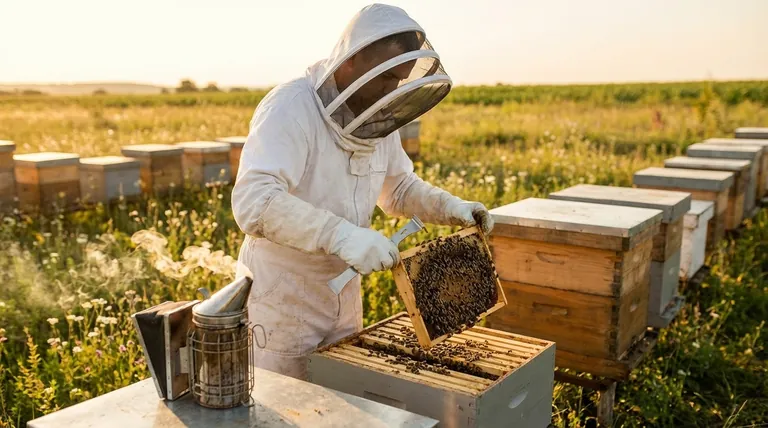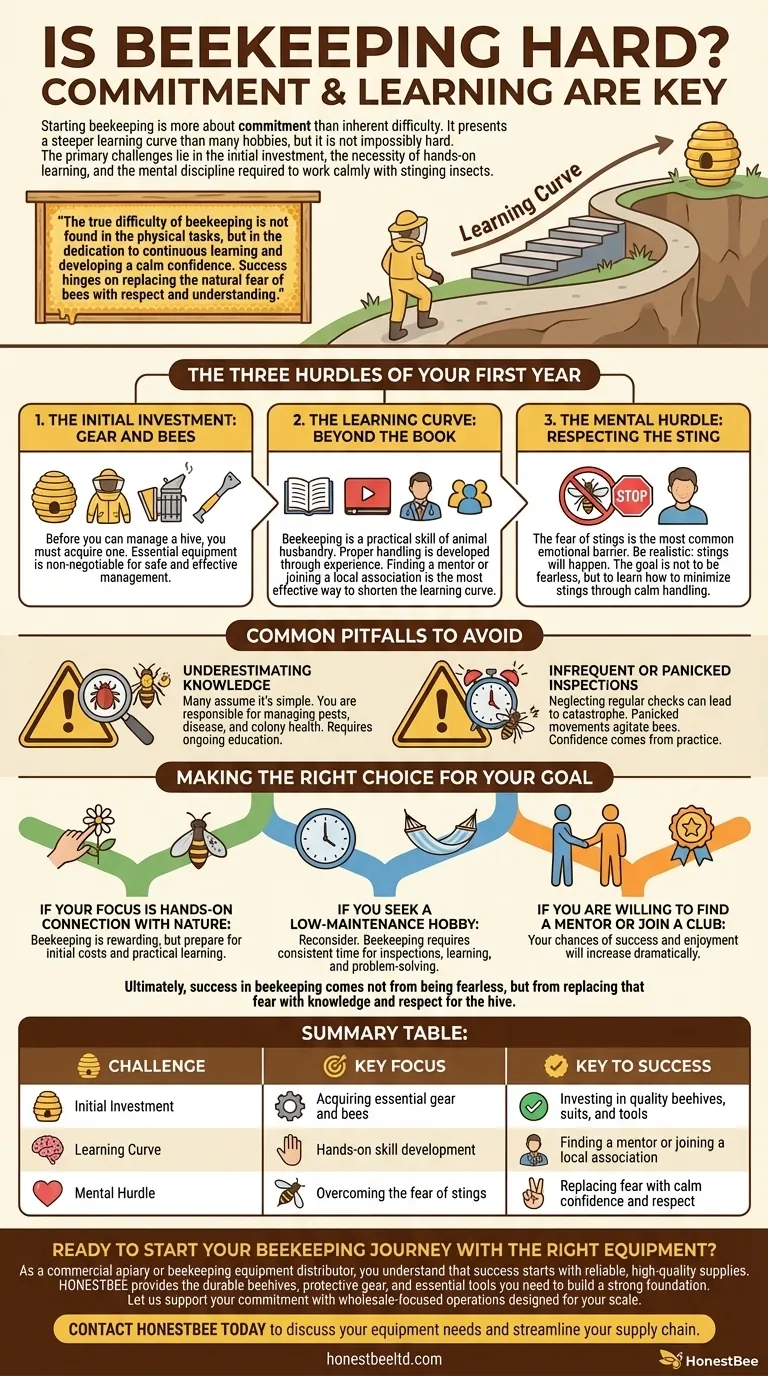Starting beekeeping is more about commitment than inherent difficulty. While it presents a steeper learning curve than many hobbies, it is not impossibly hard. The primary challenges lie in the initial investment, the necessity of hands-on learning, and the mental discipline required to work calmly with stinging insects.
The true difficulty of beekeeping is not found in the physical tasks, but in the dedication to continuous learning and developing a calm confidence. Success hinges on replacing the natural fear of bees with respect and understanding.

The Three Hurdles of Your First Year
Getting started involves overcoming three distinct challenges. Viewing them as separate steps can make the process feel much more manageable. Each requires a different kind of investment: financial, educational, and emotional.
The Initial Investment: Gear and Bees
Before you can manage a hive, you must acquire one. This represents the first tangible barrier for many aspiring beekeepers.
You will need essential equipment, including a beehive (complete with boxes and frames), a full bee suit or other protective clothing, a smoker, and a hive tool. These are non-negotiable for managing your bees safely and effectively.
The Learning Curve: Beyond the Book
Beekeeping is a practical skill that cannot be fully mastered from books or videos alone. It is the practice of animal husbandry on a superorganism of thousands of individuals.
The proper handling of bees is a nuanced skill developed through experience. Learning to move slowly, read the colony's mood, and perform inspections efficiently is something you can only learn by doing.
This is why finding a mentor or joining a local beekeeping association is the single most effective way to shorten the learning curve and build confidence.
The Mental Hurdle: Respecting the Sting
The fear of being stung is the most common emotional barrier. It’s critical to address this directly and realistically.
Bees sting, and if you keep bees, you will eventually be stung. Protective gear dramatically reduces the frequency, but it can still happen.
The goal is not to be fearless, but to learn how to handle yourself and the bees to minimize stings. Overcoming this innate fear is a crucial step in becoming a competent and calm beekeeper.
Common Pitfalls to Avoid
Understanding where new beekeepers go wrong is key to your own success. The "difficulty" is often a result of underestimating the commitment required.
Underestimating the Knowledge Required
Many beginners assume beekeeping is as simple as setting up a box and letting the bees work. This is rarely the case.
You are responsible for managing pests like Varroa mites, identifying signs of disease, and ensuring the colony has a healthy queen. This requires ongoing education.
Infrequent or Panicked Inspections
Neglecting to check on your hives regularly can allow a small, fixable problem to become a catastrophe that costs you the colony.
Conversely, panicked or clumsy movements during an inspection will agitate the bees, creating a stressful experience and increasing the likelihood of stings. Confidence comes from practice.
Making the Right Choice for Your Goal
To decide if beekeeping is right for you, consider your primary motivation and willingness to commit.
- If your primary focus is a hands-on connection with nature: Beekeeping is deeply rewarding, but prepare for the initial costs and the practical learning required to succeed.
- If you are seeking a low-maintenance hobby: You should reconsider, as beekeeping requires consistent time for inspections, learning, and problem-solving throughout the active seasons.
- If you are willing to find a mentor or join a club: Your chances of success and enjoyment will increase dramatically, making the challenging aspects far more manageable.
Ultimately, success in beekeeping comes not from being fearless, but from replacing that fear with knowledge and respect for the hive.
Summary Table:
| Challenge | Key Focus | Key to Success |
|---|---|---|
| Initial Investment | Acquiring essential gear and bees | Investing in quality beehives, suits, and tools |
| Learning Curve | Hands-on skill development | Finding a mentor or joining a local association |
| Mental Hurdle | Overcoming the fear of stings | Replacing fear with calm confidence and respect |
Ready to Start Your Beekeeping Journey with the Right Equipment?
As a commercial apiary or beekeeping equipment distributor, you understand that success starts with reliable, high-quality supplies. HONESTBEE provides the durable beehives, protective gear, and essential tools you need to build a strong foundation. Let us support your commitment with wholesale-focused operations designed for your scale.
Contact HONESTBEE today to discuss your equipment needs and streamline your supply chain.
Visual Guide

Related Products
- HONESTBEE Advanced Ergonomic Stainless Steel Hive Tool for Beekeeping
- HONESTBEE Professional Long Handled Hive Tool with Precision Cutting Blade
- Wholesales Dadant Size Wooden Bee Hives for Beekeeping
- Professional Galvanized Hive Strap with Secure Locking Buckle for Beekeeping
- Professional Drop-Style Hive Handles for Beekeeping
People Also Ask
- How does the hive splitting process contribute to colony management? Master Your Apiary Recovery Strategies
- Which technical challenges in hive maintenance are addressed by using a professional stainless steel hive tool?
- How should beekeepers handle bees when using a hive tool? Master Calm, Deliberate Techniques
- What is the function of a professional stainless steel hive tool in IFB? Optimize Your Colony Strength Assessment
- What are the primary functions of a stainless steel hive tool? Essential Equipment for Professional Beekeeping



















